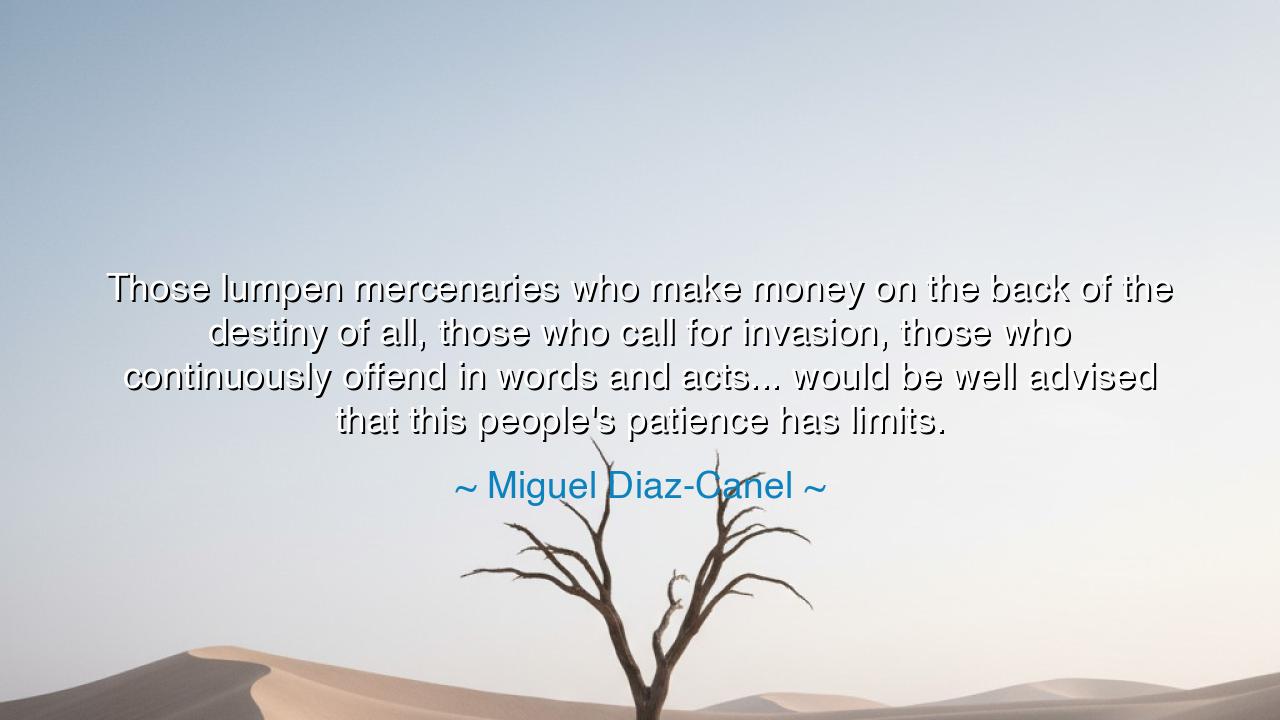
Those lumpen mercenaries who make money on the back of the
Those lumpen mercenaries who make money on the back of the destiny of all, those who call for invasion, those who continuously offend in words and acts... would be well advised that this people's patience has limits.






Hear the fiery words of Miguel Díaz-Canel, spoken as a warning, as a cry of defiance, and as a reminder of the power of the people: “Those lumpen mercenaries who make money on the back of the destiny of all, those who call for invasion, those who continuously offend in words and acts... would be well advised that this people’s patience has limits.” This is no idle saying, but a declaration forged in the furnace of struggle. It speaks of betrayal, of exploitation, and of the righteous wrath that awakens when the oppressed can endure no more.
He speaks first of mercenaries, those who trade loyalty for gold, who enrich themselves by feeding upon the pain and fate of others. In every age, such men exist—men who would sell their honor, betray their brothers, and profit from the chains of their people. To these he directs his warning: your wealth is stolen, your comfort built upon suffering, your power purchased by treachery. But know this—the people may suffer long, yet they do not suffer forever.
Then he condemns those who call for invasion. Such figures, whether foreign or domestic, invite destruction upon their own land, believing themselves shielded by power or profit. But history teaches that the people remember betrayal, and the stain of inviting foreign boots upon native soil is never washed away. To offend with words is folly; to offend with action is unforgivable. And Díaz-Canel reminds us that though the people are patient, their patience has limits.
This lesson is as old as the story of nations. Recall the peasants of France before the Revolution. For generations they bore hunger, taxation, and the arrogance of nobles. They were patient, believing endurance their only shield. But patience gave way to fire; the storming of the Bastille showed that once the limit was reached, no throne, no crown, no gilded palace could stand. So too did the patience of the Indian people, under British rule, transform into the force that Gandhi and others channeled into liberation.
Patience is a noble virtue, but it is not infinite. When twisted too far, it becomes the seed of revolt. Leaders who offend the dignity of the people, who exploit their labor, who trample their rights, are wise to remember this. They may believe that endurance is endless, that silence is consent, that submission is permanent. But when the people rise, the tide sweeps away empires.
The deeper wisdom of Díaz-Canel’s words is this: the people are not weak, though they may appear silent; their patience is not permission, but restraint. When it breaks, it breaks with the force of history itself. Those who provoke it court their own downfall, for no mercenary, no profiteer, no betrayer has ever outlasted the awakening of the multitude.
The lesson for all is clear. Do not build your wealth, your power, or your life on the suffering of others, for such foundations cannot endure. Respect the dignity of the people, whether in nations, communities, or workplaces. And if you are among the people—and we all are—remember that patience is strength, but do not allow it to chain you forever. When injustice grows unbearable, you must speak, act, and rise.
Thus the words of Díaz-Canel resound like thunder across the ages: beware those who exploit the destiny of all, for the people’s patience is deep, but not eternal. When it ends, the earth trembles, and justice, long delayed, arrives with a power that no oppressor can withstand.






AAdministratorAdministrator
Welcome, honored guests. Please leave a comment, we will respond soon